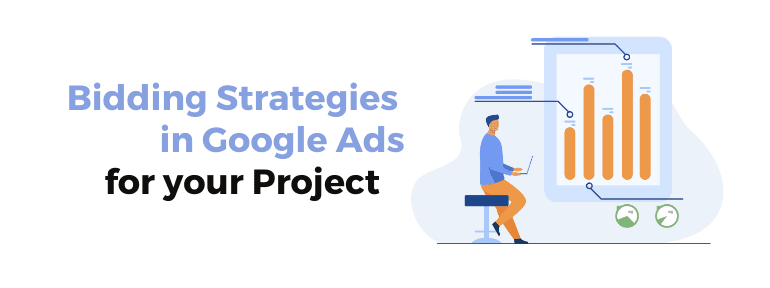When we start a project in SEM especially focused through the Google Ads platform, one of the main functions that we will have to configure will be the bid with which our ads will enter the auction for the keywords we choose.
Knowing how the different types of bids work is important to be able to use it in our projects depending on the objectives we want to achieve in them, since it is not the same a branding campaign that a campaign focused on getting conversions, therefore it is essential to have a bidding strategy in Google Ads is essential.
Table of contents
What is the bidding system in Google Ads?
When we are developing our campaigns, the way in which Google establishes the order in which we appear, or if we are going to appear in the sponsored search results, is established through a bidding system.
The order of the steps would be as follows. First a user makes a query in the Google search engine, this activates certain keywords for which we and other competitors are bidding.
Depending on what investors want to spend, a bid will be set by which we can get a free way to impact, so to speak, the user of the query with our services or products with which we are trading.
In this auction system, the first place for advertisers, will be for the one with the highest score in what Google calls Quality Score and that will determine the position. Of course, this score will be influenced, among other things, by the amount we pay for each bid.

Manual bidding strategies
In this type of bidding we have all the control and we will decide how much is the maximum that can be spent for each keyword depending on our budget and the study that we have done previously to know what average price levels have these keywords. There is a purely manual strategy and a semi-automatic one.
- Manual CPC Strategy: as I was saying it will allow us to select what we spend for each word, so for example if within a group of ads we believe that we have more transactional or more interesting words for our project we can assign a higher Maximum CPC amount, while in the more generic or less interesting ones we can decrease this amount.
- Manual CPC Strategy with Enhanced CPC. In this case we will still be able to set the bids individually for each keyword but here Google will take the liberty of depending on data it has from the history of conversions, to raise if it deems appropriate the maximum cpc paid to meet a query because it considers that it is very likely to get the conversion.
Advantages of using manual bidding strategies
- Advisable option in low budgets or at the beginning of projects. Having more control will save us the hassle that can cause automatic bids especially at the beginning making the budget does not last any time. The same as in the case of low budgets.
- Total control for each Keyword: not all keywords are equally important, so with this strategy we can incentivize with more budget those that are giving us better results.
Automatic bidding strategy
With this type of strategy, for better or worse, we will leave all the control to Google of what we are going to pay in each auction, making that in some cases we can really benefit from it and in others maybe not so much.
The good performance of this type of strategies will depend on knowing when we can apply them.
Some of them, as Google tells us, we must have a minimum number of monthly conversions so that we can have enough data about which users are truly potential converters for our project and be able to participate in the auctions in a more effective way. Some of the most representative are the following:
- Maximize clicks: in this type of bidding the only thing we have to establish is the daily amount of budget we want to use and if we want to set a maximum CPC cap. It will take a few days to work properly and the main drawback is that it does not allow us to increase spending on those keywords that we consider interesting.
- Maximize Conversions: like the previous bid we must set the daily spending we want to be carried out and in this case Google manages spending based on the conversions obtained.
- ROAS Objective: Google will choose the bids to help you get the highest conversion value possible while maintaining the return on advertising investment.
- Target CPA: in this strategy Google automatically sets the bids to get as many conversions as possible with the target cost per action that we have defined.
Advantages of using automatic bidding strategies
- Return on investment: if we have a good history in the account and the movement is large to have a good number of conversions, it will allow us to apply an automatic bid focused on ROI or automated to get conversions.
- Time saving: If the account is very large and we have many campaigns, this type of bidding will save us a lot of time when it comes to optimizing them.
Which strategy to choose depending on your project
If we find ourselves with newly initiated projects it will be very difficult to use automated bids based on conversions such as CPA, or ROAS, we will have to go either to manual strategies, where we have all the control, or automatic strategies based on getting traffic.
Strategies to get traffic can also be beneficial for recent projects that barely receive users organically and need to dynamize the web in a fast way.
When the projects are consolidated and we can give Google all the data it needs to be able to clearly establish which type of user is the one that converts us, we can use bids focused on returns on investment.
Finally we have the possibility of paying for views and not for clicks, this is the case of display campaigns
In these cases, the most convenient choice may be to set a payment price for each certain number of views of our chosen display. With this we will reach many users and if otherwise we prefer to attract traffic to the website through the display we can set a pay per click bid.
Conclusions
Choosing the bid we are going to use will have to be done based on factors such as the objectives we want to achieve such as traffic, views or conversions, and if possible to properly configure the automatic bids focused on ROI as they depend on several factors that not all advertisers have.
The stage of the project in which the advertiser is in is important to take into account because in the case of start-up businesses or certain campaigns such as a one-off promotion, it may be more interesting to base them on traffic quantities




Deja un comentario